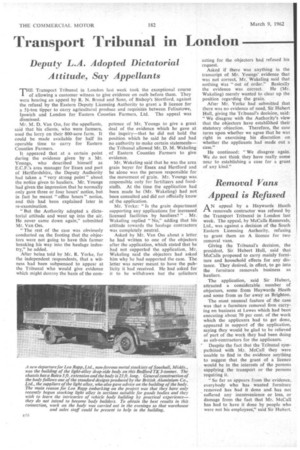Transport Tribunal in London
Page 50

If you've noticed an error in this article please click here to report it so we can fix it.
Deputy L.A. Adopted Dictatorial Attitude, Say Appellants
THE Transport Tribunal in London last week took the exceptional course of allowing a customer witness to give evidence on oath before them. They were hearing an appeal by R. N. Broad and Sons, of Bishop's Stortford, against the refusal by the Eastern Deputy Licensing Authority to grant a B licence for a 5f-ton tipper to carry agricultural produce and requisites between Felixstowe, Ipswich and London for Eastern Counties Farmers, Ltd. The appeal was dismissed.
Mr. M. D. Van Oss, for the appellants, said that his clients, who were farmers, used the lorry on their 800-acre farm. It could be made available for half its operable time to carry for Eastern Counties Farmers.
It appeared that at a certain point during the evidence given by a Mr. Youngs, who described himself as E.C.F.'s area manager for Essex and part of Hertfordshire, the Deputy Authority had taken a "very strong point" about the notice given to hauliers. Mr. Youngs had given the impression that he normally only gave three or four hours' notice, but in fact he meant "office hours" notice, and this had been explained later in re-examination.
"But the Authority adopted a dictatorial attitude and went up into the air. He never came down again," submitted Mr. Van Oss.
"The rest of the case was obviously conducted on the footing that the objectors were not going to have this farmer breaking his way into the haulage industry," he added.
After being told by Mr. R. Yorke, for the independent respondents, that a witness had been subpcenaed to appear at the Tribunal who would give evidence which might destroy the basis of the corn petence of Mr. Youngs to give a great deal of the evidence which he gave at the inquiry—that he did not hold the position which he said he did and had no authority to make certain statements— the Tribunal allowed Mr. D. M. Wakeling of Eastern Counties Farmers to give evidence.
Mr. Wakeling said that he was the area grain buyer for Essex and Hertford and he alone was the person responsible for the movement of grain. Mr. Youngs was responsible only for fertilizers and foodstuffs. At the time the application had been made he (Mr. Wakeling) had not been consulted and did not officially know of the application.
Mr. Yorke: " Is the grain department supporting any applications for increased licensed facilities by hauliers? " . Mr. Wakeling replied "No," adding that his attitude towards the haulage contractors was completely neutral.
Asked by Mr. Van Oss about a letter he had written to one of the objectors after the application, which stated that he had not supported the application, Mr. Wakeling said the objectors had asked him why he had supported the case. The letter was never meant to have the publicity it had received. He had asked for it to be withdrawn but the solicitors acting for the objectors had refused his request..
Asked if there was anything in the transcript of Mr. Youngs' evidence that was not correct, Mr. Wakeling said that nothing Was " out of order." Basically the evidence was correct. He (Mr. Wakeling) merely wanted to clear up the position regarding the grain.
After Mr. Yorke had submitted that there was no evidence of need, Sir Hubert Hull, giving the Tribunal's decision, said: "We disagree with the Authority's view that the objectors have establiShed their statutory objection. Therefore, the case turns upon whether we agree that he was right in exercising his discretion on whether the applicants had made out a case."
He continue& "We disagree again. We do not think they have really come near to establishing a case for a grant of any kind."




































































































































